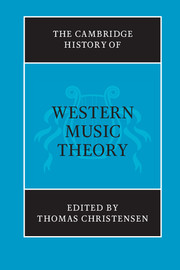Book contents
- Frontmatter
- Introduction
- PART I DISCIPLINING MUSIC THEORY
- PART II SPECULATIVE TRADITIONS
- 4 Greek music theory
- 5 The transmission of ancient music theory into the Middle Ages
- 6 Medieval canonics
- 7 Tuning and temperament
- 8 The role of harmonics in the scientific revolution
- 9 From acoustics to Tonpsychologie
- 10 Music theory and mathematics
- PART III REGULATIVE TRADITIONS
- PART IV DESCRIPTIVE TRADITIONS
- Index of authors
- Index of subjects
- References
4 - Greek music theory
from PART II - SPECULATIVE TRADITIONS
Published online by Cambridge University Press: 28 March 2008
- Frontmatter
- Introduction
- PART I DISCIPLINING MUSIC THEORY
- PART II SPECULATIVE TRADITIONS
- 4 Greek music theory
- 5 The transmission of ancient music theory into the Middle Ages
- 6 Medieval canonics
- 7 Tuning and temperament
- 8 The role of harmonics in the scientific revolution
- 9 From acoustics to Tonpsychologie
- 10 Music theory and mathematics
- PART III REGULATIVE TRADITIONS
- PART IV DESCRIPTIVE TRADITIONS
- Index of authors
- Index of subjects
- References
Summary
Introduction
In the history of Western music theory, technical works written in Greek on the general subjects of “music” (μoνσική) and “harmonics” (αρμoνικά) play an anomalous role. On the one hand, they are not “Western,” especially in the linguistic and geographic senses reinforced in the Middle Ages by the gradual schism between Eastern and Western Christendom. On the other hand, the tradition never ceased to exert an influence during this period, not only because some parts of it were carried over into the West by authors writing in Latin, but also because the early church readily acknowledged and accepted – though not without reservations – the ancient power of music and its centrality to human existence. This combination of causes was sufficient to sustain an interest in early writings on music, especially those in Greek, throughout the Middle Ages. Thus, unlike other early Eastern traditions, the tradition represented by Greek works on music and harmonics assumed a prominence in the West even as it acquired a sense of the esoteric and foreign, a duality of character it retains in the modern conception of “ancient Greek music theory.”
Prior to the Middle Ages, the tradition of writing technical works in Greek “on music” (περì μoνσικηs), on the subject of “harmonics” (άρμoνικά), or as a general introduction (εìσαγωγη) to one or both subjects was extraordinarily resilient, extending easily over eight centuries. But by the collapse of Rome in the fifth century CE, the tradition had become moribund, though certainly not entirely forgotten.
- Type
- Chapter
- Information
- The Cambridge History of Western Music Theory , pp. 107 - 135Publisher: Cambridge University PressPrint publication year: 2002
References
- 1
- Cited by

